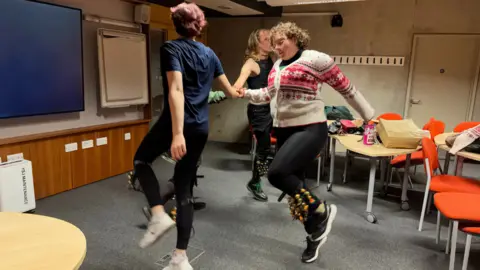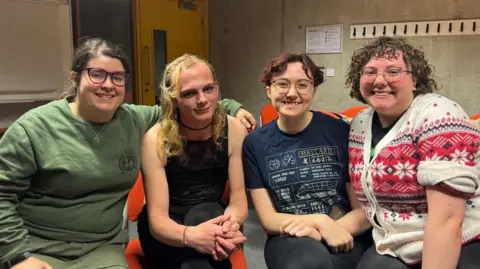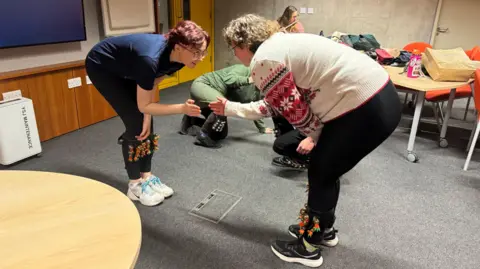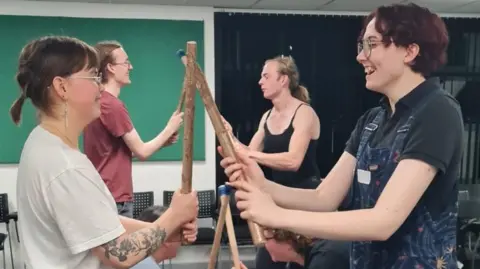'We started a queer-inclusive Morris dance group'
 BBC/ Emily Johnson
BBC/ Emily JohnsonIt's an English folk tradition that dates back to the 15th Century, but a group of Morris dancers in York are determined to make the pastime more inclusive.
Ramshackle Morris was set up as a place where "everybody can be themselves" and is a queer and gender-inclusive space free of strict membership rules.
The dancers rehearse at the University of York and some have been taking part in Morris activities since they were children. Since 2023, female dancers in the UK have outnumbered men.
Ramshackle Morris said the response had been "incredible" and they expected their team - known as a side - to have more than 20 members by early 2025.
Kitted up in ankle bells, Hetty Skinner, Liese Frost, Sophie Appleyard and Catherine Lands put on a demonstration in a university classroom while their friend played the flute.
"My whole life I've been into Morris dancing," said Catherine, the side's dance teacher. "I used to dance in my hometown and when I got to uni, I joined the folk society and danced with them as well.
"Then I met up with my friends from York St John University and we all decided we should create our own side."
 BBC/ Emily Johnson
BBC/ Emily JohnsonThe four original members, aged between 20 and 25, mostly became interested in Morris dancing through their families.
However, when starting their own group, they wanted to adapt tradition for the modern day.
One of the members, Sophie, is a trans woman and said she had faced rejection from a female-only side, on the grounds of her gender identity and appearance.
The group added some of their non-binary dancers had wanted to join a Morris dancing team for some time but had been "discouraged" by other York clubs being single-gender only.
"One of the main reasons we started Ramshackle was due to lack of understanding and acceptance of gender-queerness in the single-gender sides," said Liese, the group's bagman, or secretary.
Hetty added: "We said right from the off we just wanted to be inclusive, so gender inclusive, queer inclusive, disability inclusive.
"We're all very neurodivergent people and we thought it'd be really helpful just to have a team where everyone could be themselves."
They also wanted to distance themselves from some of the most controversial historic aspects of Morris performances.
'Change needed'
Sophie, who is a third generation Morris dancer, said: "When people think of Morris dancing, a lot of the time they think of blackface."
Although not all dancers used black face paint, she explained the "Border" style of Morris dancing involved wearing coal dust on the face as a "disguise" in the 1400s.
"You collect when you do Morris dancing and it was seen as begging," she added. "It disguised their faces, so as not to be recognised by friends and neighbours."
In later years, the practice was believed to have links to 19th Century minstrel shows and it has since been outlawed by governing bodies the Morris Federation and the Morris Ring.
"When it came to the organisation's attention that people were getting offended by it and it was becoming a big issue, we recognised things needed to change," Sophie said. "At most, there are half black or multiple colours of face paint."
 BBC/ Emily Johnson
BBC/ Emily JohnsonAnother major change is that the Morris community is moving away from single gender sides.
"Traditionally, people think of men doing it but there are a lot of really good women’s sides out there and good mixed sides," Sophie added.
Women now make up 50.6% of registered dancers, while men make up 48.6% and non-binary people make up 0.8%.
Since advertising Ramshackle Morris online, the group has generated a lot of interest.
"The response has been incredible," said Liese. "We're up to 17 members now, with five more coming in January."
Dancers between the ages of 17 and 57 have signed up to the side, which is free to attend for the first four weeks.
 Ramshackle Morris
Ramshackle MorrisRamshackle are hoping to charge an annual fee to cover the cost of equipment and safety.
"We hope to do a lot of different dances and maybe create some of our own dances as well and make up our own tradition in some way," Catherine added.
"We're going to wipe purple across our eyes to hark back to York's Viking past."
Once the side is properly established, the dancers hope to book out York's King's Square for outdoor performances in 2025.
They also plan to perform at a variety of folk festivals throughout next year.
Listen to highlights from North Yorkshire on BBC Sounds, catch up with the latest episode of Look North or tell us a story you think we should be covering here.
